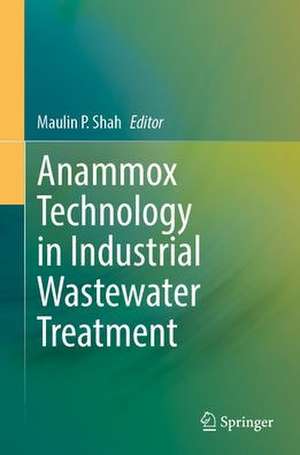Anammox Technology in Industrial Wastewater Treatment
Editat de Maulin P. Shahen Limba Engleză Hardback – 18 iun 2023
Preț: 998.51 lei
Preț vechi: 1217.70 lei
-18% Nou
Puncte Express: 1498
Preț estimativ în valută:
191.09€ • 207.49$ • 160.51£
191.09€ • 207.49$ • 160.51£
Carte tipărită la comandă
Livrare economică 22 aprilie-06 mai
Preluare comenzi: 021 569.72.76
Specificații
ISBN-13: 9789819934584
ISBN-10: 9819934583
Ilustrații: V, 151 p. 14 illus., 9 illus. in color.
Dimensiuni: 155 x 235 mm
Greutate: 0.4 kg
Ediția:2023
Editura: Springer Nature Singapore
Colecția Springer
Locul publicării:Singapore, Singapore
ISBN-10: 9819934583
Ilustrații: V, 151 p. 14 illus., 9 illus. in color.
Dimensiuni: 155 x 235 mm
Greutate: 0.4 kg
Ediția:2023
Editura: Springer Nature Singapore
Colecția Springer
Locul publicării:Singapore, Singapore
Cuprins
Ammonia oxidizing bacteria in wastewater.- Ammonia-oxidizing bacteria: Biochemical and molecular characteristics.- Anaerobic ammonium oxidation using engineered nanomaterials as potential modulators.- Anammox-cell biology, metabolism, growth and genetics.- Cultivation, growth physiology, and chemotaxonomy of nitrite-oxidizing bacteria.
Notă biografică
Dr. Maulin P. Shah is interested in genetic adaptation processes in bacteria. He has more than 120 research publications in highly reputable national and international journals. He directs the research program at Enviro Technology Ltd., Ankleshwar, India. He has guided more than 100 postgraduate students in various disciplines of life science. He is an active editorial board member in more than 150 renowned journals in the field of environmental and biological sciences. He was the founder and the editor-in-chief of the International Journal of Environmental Bioremediation and Biodegradation (2012–2014) and the Journal of Applied & Environmental Microbiology (2012–2014) [Science and Education publishing (SciEP), USA]. He is also serving as a reviewer for various journals of national and international repute. Recently, he has been awarded a Young Biotechnologist Medal by the Biotechnological Society of Nepal. He has edited 25 books in the area of wastewater microbiology and industrial wastewater treatment as well as over 50 books in the area of water and wastewater treatment.
Textul de pe ultima copertă
Ammonia in wastewater causes the eutrophication of water bodies and the subsequent depletion of dissolved oxygen. In addition, certain forms of nitrogen such as ammonia, nitrite, and nitrate are highly toxic to aquatic life. Although there are several biological and physical–chemical techniques for the removal of ammoniacal nitrogen compounds, including air stripping and breakpoint chlorination, which have been widely applied, a microbiological or microbe-based approach is attractive because it is based on sustainable technologies. In this regard, ammonia-oxidizing bacteria have recently gained great interest, specifically in wastewater treatment plants for the removal of ammoniacal nitrogen especially, owing to its relatively low capital cost, eco-friendliness, and high efficiency when compared with conventional cleanup technologies. This book provides specific and advanced knowledge on the microbial ecology of ammonia-oxidizing bacteria and their diversity and functions in the treatment of toxic pollutants present in wastewater. The book thus serves as a valuable resource for engineers, scientists, and managers who require an excellent introductory and advanced knowledge of the field, professionals who are working or interested in the environmental microbiology or bioremediation field, and students learning about environmental biotechnology and microbiology.
Caracteristici
Describes the application of various omics tools Presents the role of ammonia-oxidizing bacteria in wastewater treatment plants Shows the microbial ecology and diversity of ammonia-oxidizing bacteria
